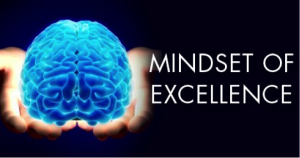
How can you use a mindset of excellence to grow your business?
Imagine two business owners in the same market, with basically the same product and same target market, but the two businesses produce very different results. One is doing well, the other isn’t. One business owner seems on top of their game, the other isn’t. One business is growing, the other business is barely scraping by and the owner of the second business wonders whether it is either time to sell, or just shut the doors.
What is the difference between the two businesses? There are a number of possible factors, including the owners’ knowledge and ability to run the business, the systems that are in place and the team that drives the business forward. Pricing, marketing and sales all play a part as well. Many factors play into the successful, growing business. Yet, there is one characteristic that creates the largest differentiator between the two business environments. That is the mindset of the business owner. How do they look at each situation or economic obstacle, every customer, every challenge and life in general?
If your attitude is similar to Eeyore’s- the “woe is me” donkey that hangs with Winnie the Pooh—life is hard, this is what happened, I don’t get the same opportunities as others, the economy is really hurting, your results will reflect your attitude. Not taking responsibility is a “below the line” mindset of blame, excuses and denial. By blaming others, making excuses as to why things don’t get accomplished, and not taking accountability for your results, you remain a powerless victim to the world around you, and you become the main source of the issues plaguing the business.
Or is your attitude “above the line”? Do you as a business owner take ownership, accountability and responsibility for everything that happens in your business? You have the power to control everything that happens in 3 ways:
1) You control what you do
2) You control what you don’t do
3) You control how you respond to everything else
How your day goes is totally up to you, how you react to situations and what opportunities are ahead even through disasters. Steve Jobs got fired from Apple – not what he called the best day of his life, yet without being fired from Apple he would not have created Pixar and NeXT which are part of the foundation of the Apple products people love today. Above the line thinking creates empowerment, and empowerment creates results.
You can see the critical impact of attitude every day in the business world. What one business owner may see as a disaster, another business owner may see as an opportunity. People who have spent their lives in below the line thinking often don’t even realize the impact it has on them personally and in their families, businesses, customers and potential.
If you are below the line, so is your team, then the effects multiply exponentially. As a business owner, you set the tone for the business. An owner who is below the line will hire staff that will follow that lead and turn to blame, excuses and denial. It is someone else’s fault that the project is late, someone else’s fault that the customer is upset. To change, they will need someone to hold them accountable to point out where they are below the line.
As I work with clients on this concept, the tendency is to swing to a point where issues in the business are not discussed with an excuse. This doesn’t mean the business may white wash any issues it faces. It means empowerment to take ownership and responsibility for changing the issue. If projects are late, that is a fact. The question is what must change in the business to ensure projects are not delivered late. You have to take responsibility in order to improve the business.
If you want to reach your full potential, try taking responsibility for every single thing for one week. Everything will fit into one of the 3 categories above. Just do it for a week. How does it feel? What doors does it open for you when you have a responsibility mindset? What opportunities do you now consider that you might not have before? What impact could that have on your business? How much time and energy do team members waste just assigning blame? Where does that lead? How is the energy level in the business changing? What productivity improvements can you see potential for with an “above the line” attitude?
When I ask my clients if they want to be average, the resounding answer is NO. They want to be the best. To make that happen, your mindset must change to one of excellence or responsibility — above the line thinking — your results will be amazing.
